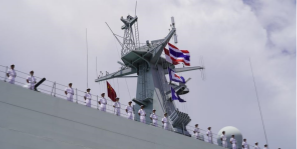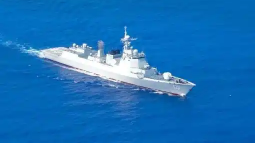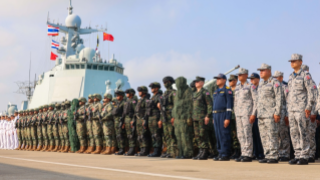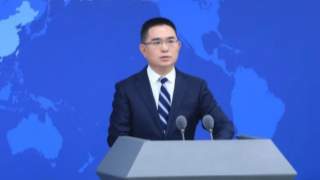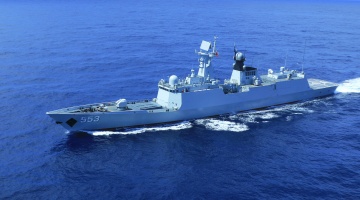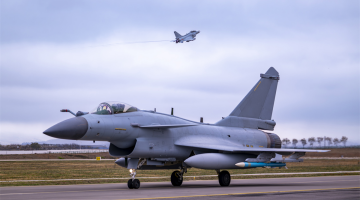Iran launched a new round of open military operations amid heightened tensions in the Red Sea. On the night of January 15, Iran's Islamic Revolutionary Guard Corps launched a missile attack on Erbil, the capital of the Kurdish Autonomous Region in northern Iraq. Iran's move shows that the risk of further intensification and escalation of the Red Sea crisis is becoming a reality.
Previously, the warplanes of the US and the UK, with the support of Australia, Bahrain, Canada and the Netherlands, had carried out more than 50 air strikes and missile strikes against Yemeni targets in the capital city Sanaa, the Red Sea city Hodeidah and the northern Saada province since January 12.
During this period of turmoil, two significant actions including the formation of the Red Sea escort alliance, and joint airstrikes against Houthi forces in Yemen reflect the US tactic of addressing hotspots in the Middle East through "alliance-based confrontation" and "divide and conquer," demonstrating its primary goal of safeguarding its own strategic interests.
The Red Sea waterway, one of the world's most crucial maritime routes, is directly linked to the vital interests of the US and its allies in the changing regional dynamics. The US’ formation of the escort alliance aims to maintain the security of maritime passages, thus preserving its regional hegemony.
Besides, to counter its isolation in the international community, the US, under the pretext of "maintaining the safety of Red Sea shipping and the trade interests of all countries," seeks to lead a military alliance, provoke conflicts against Houthi forces, shift international public opinion pressure, and achieve the goal of restraining the Houthi forces and Iran.
However, the formation of the US-led Red Sea escort alliance has not achieved the expected results. From the reactions of the participating parties, there is a lack of enthusiasm among countries to join the alliance, with some countries refusing to disclose their participation publicly. Moreover, the details of the action plan for the escort alliance are vague, causing confusion and suspicion among external observers. Some countries remain hesitant on the issue. They are unwilling to openly declare alignment with the US, fearing public opinion pressure on the Israel-Palestine conflict, diplomatic challenges and even the risk of retaliation from Houthi forces.
To manage the hidden risks of the spillover effects of the Palestinian-Israeli conflict, US Secretary of State Antony Blinken has recently visited the Middle East four times, attempting to control risks through diplomatic mediation. Blinken emphasized that the US stands against forcibly displacing Palestinian civilians from Gaza, advocates for the release of hostages, and prevents the spilloverof the Palestinian-Israeli conflict. However, Blinken ignored the strong calls from Middle Eastern countries for an immediate ceasefire in Gaza and expressed support for Israel's "legitimate self-defense" rights. The contradictory stance of the US has been widely questioned and criticized by regional countries.
The US-UK coalition launched airstrikes against Houthi forces just a day after Blinken concluded his latest Middle East trip. By striking Houthi forces, the US can present itself as the security provider for safeguarding Red Sea shipping to the international community. Simultaneously, it continues its consistent approach of "divide and conquer," creating conflicts to induce regional chaos, further strengthening support for Israel, and maintaining its regional hegemony and alliance system.
Since the implementation of the Asia-Pacific Rebalance Strategy during the Obama administration, the US strategic focus has gradually shifted away from the Middle East towards the Asia-Pacific region with a focus on rallying allies to join its global power competition strategy.As the strategic focus of the US shifts, the reorganization of order in the Middle East has accelerated significantly.
However, based on its strategic architecture of maintaining regional hegemony, the US is unwilling to see the realization of regional integration or the emergence of regional leaders in the Middle East. Fueled by anxiety over the decline of its strategic position and diminishing dominance after withdrawing from the Middle East, the US continues to adopt tactics of "alliance-based confrontation" and "divide and conquer", to create and magnify hostile relations among regional countries to control the regional situation in the long term through its offshore balancing approach.
In this context, the US, through the formation of the escort alliance and military deterrence, seeks to disrupt the cooperation processes of countries through the chaotic Red Sea situation, entangle Saudi Arabia and Iran in turmoil again, undermine the positive trend of peaceful development in the Middle East, and thereby enhance its regional influence, safeguard its regional interests, and achieve its strategic goals.
(Hou Yuxiang is dean of the School of Middle Eastern Studies of Beijing International Studies University.)
Editor's note: Originally published on chinanews.com, this article is translated from Chinese into English and edited by the China Military Online. The information and opinions in this article do not necessarily reflect the views of eng.chinamil.com.cn.

